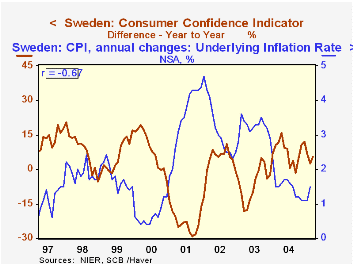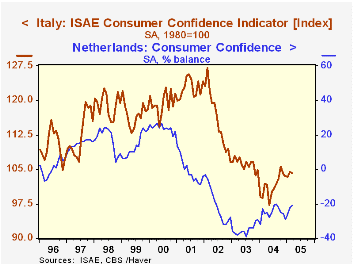 Global| Mar 23 2005
Global| Mar 23 2005Consumer Confidence Up over Last Year in Sweden, Netherlands and Italy, But Consumers Still Seem Unwilling To Spend
Summary
Consumer confidence is little changed this month in three European countries. In Sweden, the monthly "CCI" indicator, eased from +11.6% to +10.7%; Italy's index also decreased, by 0.3% to 104.1 from 104.4 in February. The balance [...]

Consumer confidence is little changed this month in three European countries. In Sweden, the monthly "CCI" indicator, eased from +11.6% to +10.7%; Italy's index also decreased, by 0.3% to 104.1 from 104.4 in February. The balance indicator in the Netherlands edged "up" to -21 from -22. These three movements indicate moderate improvements in all three countries over the last year, but in the two for which buying plans are also reported, there is little willingness to increase spending.
In Sweden, the distinctive feature about the recent behavior of the "CCI" is the narrow range of its movement. Through the 1990s and up to 2002, this indicator moved down and up in wide cyclical swings, or in shorter oscillations. In contrast, over the last 18 months or so, it has held to a narrow range, maintaining similar, moderately positive readings from month to month. This pattern coincides with relative stability of the kronor against the euro. It also corresponds to a period of near stability in Swedish consumer prices (see graph). Since February 2004, year-on-year inflation in Sweden has hovered between 1.1% and 1.7%, gauged according to the so-called "underlying" rate. The steadiness of the price situation at such low inflation rates is most probably encouraging to consumers.
Dutch consumers seem encouraged by what they perceive as a better outlook for the Dutch economy as a whole, a component of this survey which has moved in parallel with overall confidence since the middle of 2003. However, this seems not to translate into ideas about spending more, as the "willingness to buy" component has hardly moved over the same time span. In the Netherlands, improvements in the economic climate are relative: the climate index is still negative, but less so. Similarly, employment is no longer falling, but it has been no more than holding its own in recent months. We'd surmise that until employment actually turns consistently upward, the "willingness to buy" indicator will sustain its recent sluggish readings.
The improvement in Italian confidence is relative too. While the index based on 1980 values has gained since early last year, the components expressed as favorable-less-unfavorable balances remain mostly negative, some quite strongly so. Thus, hesitation and uncertainty seem to be the order of the day with the result that "current intention to make major purchases" is the most negative item in the survey.
| Mar 2005 | Feb 2005 | Year Ago | 2004 | 2003 | 2002 | |
|---|---|---|---|---|---|---|
| Sweden (% Balance) | 10.7 | 11.6 | 5.1 | 8.7 | 0.9 | 7.2 |
| Netherlands (% Balance) | -21 | -22 | -26 | -25 | -35 | -20 |
| Italy (1980 = 100) | 104.1 | 104.4 | 101.8 | 101.4 | 106.1 | 115.8 |
Carol Stone, CBE
AuthorMore in Author Profile »Carol Stone, CBE came to Haver Analytics in 2003 following more than 35 years as a financial market economist at major Wall Street financial institutions, most especially Merrill Lynch and Nomura Securities. She had broad experience in analysis and forecasting of flow-of-funds accounts, the federal budget and Federal Reserve operations. At Nomura Securities, among other duties, she developed various indicator forecasting tools and edited a daily global publication produced in London and New York for readers in Tokyo. At Haver Analytics, Carol was a member of the Research Department, aiding database managers with research and documentation efforts, as well as posting commentary on select economic reports. In addition, she conducted Ways-of-the-World, a blog on economic issues for an Episcopal-Church-affiliated website, The Geranium Farm. During her career, Carol served as an officer of the Money Marketeers and the Downtown Economists Club. She had a PhD from NYU's Stern School of Business. She lived in Brooklyn, New York, and had a weekend home on Long Island.
More Economy in Brief
 Global| Feb 05 2026
Global| Feb 05 2026Charts of the Week: Balanced Policy, Resilient Data and AI Narratives
by:Andrew Cates





